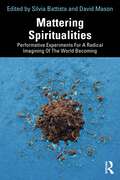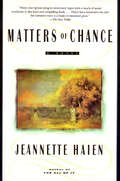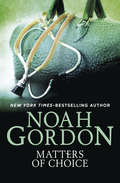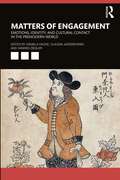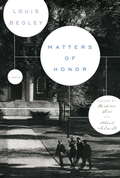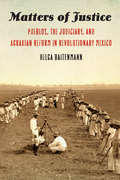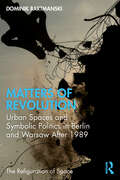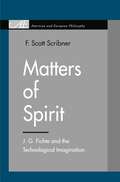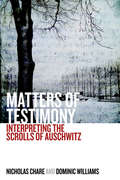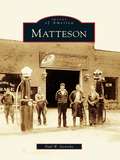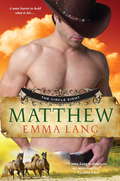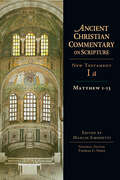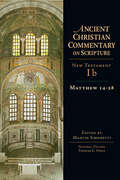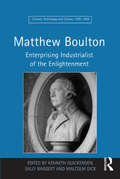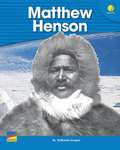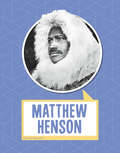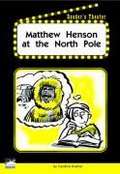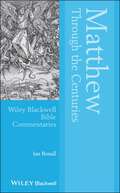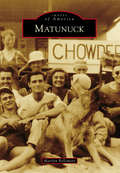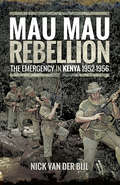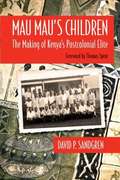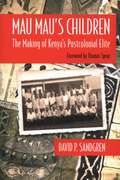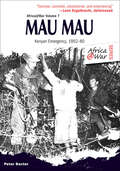- Table View
- List View
Mattering Spiritualities: Performative Experiments for a Radical Imagining of the World Becoming (Routledge Advances in Theatre & Performance Studies)
by David Mason Silvia BattistaMattering Spiritualities brings together an array of international scholars and practitioners to explore spirituality in embodiment through the lens of performance, performative writing, and performance studies.The book concerns spirituality and takes the body as the site of whatever it is we call spirituality. The methodological assumption is that the opposition of body and spirit is a false binary that calls for re-examination and revision. It stems from the argument that people can deliberately shift their boundaries of perception and knowing through practice, technologies and performative techniques that can alter the way in which they perceive the ecologies in which they are embedded. This approach understands that careful attention to which bodies are performing in any given scenario is crucial, as is a sensitivity to the ramifications of any body’s race, gender, class, and biological ability. Performance can therefore be regarded as anything through which individuals and collectives experiment with bodies as technologies. Each chapter engages with such experiments to explore how bodies experience and relate to other bodies, human and other-than-human, but also how, by mobilizing bodies and changing relationships between them, practitioners can transform people, spaces and places, objects, ecologies large and small, and shift the borders-of-the-known. Such experiments can also reveal intersectional dynamics within given social, political, and biological borders offering new perspectives and angles of analysis.This collection intends to serve transdisciplinary studies and to support varied learning and teaching environments for undergraduate, postgraduate, and PhD students.
Matters of Chance: A Novel
by Jeannette HaienAn affluent family navigates life before, during, and after World War II in this “masterpiece” by the author of All of It (Fort Worth Star-Telegram).“One of the best books of the year.” —Publishers Weekly“Haien’s remarkable evocation of war at sea, her nuanced perception of the complexities of marriage, and the grand sweep of her tale remind us of the deep pleasures of an old fashioned read.” —ElleMatters of Chance is a glorious, captivating novel about Morgan and Maude Shurtliff, who fall in love and marry in the years before World War II. Unable to have children of their own, Morgan and Maude adopt twin girls. The four go home to their beautiful house in the country outside of New York City and begin to settle into what they hope will be a long and happy life. When the twins are still young, Morgan is called to serve in World War II, leaving Maude to raise her daughters alone. Jeannette Haien has rendered Morgan’s war experiences with astonishing detail, just as she has captured the American post-war era with a precision that is unrivaled in recent fiction . . . “Every description mingles missionary vigor with a touch of moral revelation in this kind and compelling book. . . . Haein has a musician’s ear, and her narrative voice is a study in measured grace.” —The New Yorker“Matters of Chance is a big, fat, wonderful, absorbing novel reminiscent of Anthony Trollope.” —Detroit Free Press“A marvelous new novel. . . . Elegant. . . . Exquisitely written. . . . One of Haien’s greatest gifts as a writer is her power to capture moments of heightened consciousness and sear them into a reader’s imagination.” —NPR’s Fresh Air
Matters of Choice: The Physician, Shaman, And Matters Of Choice (The Cole Trilogy #3)
by Noah GordonA woman physician confronts the moral issues of her time in the third novel in the New York Times–bestselling author&’s historical medical trilogy. Roberta Jeanne d&’Arc Cole is favored to be named associate chief of medicine at a Boston hospital. She is married to a surgeon. They own a trophy residence on historic Brattle Street in Cambridge and a summer house in the Berkshire Hills. Everything melts away. Her gender and her work at an abortion clinic cost her the hospital appointment. Her marriage fails. Crushed, she goes to the farmhouse in Western Massachusetts, thinking to sell it, and finds an unexpected life. How she continues to fight for every woman&’s right to choose, while acknowledging her own ticking clock and maternal yearning, makes this prize-winning third story of the Cole trilogy as relevant as tomorrow.
Matters of Engagement: Emotions, Identity, and Cultural Contact in the Premodern World
by Daniela Hacke; Claudia Jarzebowski; and Hannes ZieglerBy drawing on a broad range of disciplinary and cross-disciplinary expertise, this study addresses the history of emotions in relation to cross-cultural movement, exchange, contact, and changing connections in the later medieval and early modern periods. All essays in this volume focus on the performance and negotiation of identity in situations of cultural contact, with particular emphasis on emotional practices. They cover a wide range of thematic and disciplinary areas and are organized around the primary sources on which they are based. The edited volume brings together two major areas in contemporary humanities: the study of how emotions were understood, expressed, and performed in shaping premodern transcultural relations, and the study of premodern cultural movements, contacts, exchanges, and understandings as emotionally charged encounters. In discussing these hitherto separated historiographies together, this study sheds new light on the role of emotions within Europe and amongst non-Europeans and Europeans between 1100 and 1800. The discussion of emotions in a wide range of sources including letters, images, material culture, travel writing, and literary accounts makes Matters of Engagement an invaluable source for both scholars and students concerned with the history of premodern emotions.
Matters of Honor: A Novel
by Louis Begley"Terrifically intelligent, moving, and entertaining."-The New York Sun"With snappy dialogue [and] intelligent prose . . . Begley paints a memorable portrait of lasting friendship and of the strength required to step outside of the expectations that surround each of us."-Rocky Mountain News. At the beginning of the 1950s, three disparate young men are thrown together as roommates at Harvard College: Henry White, a Polish-Jewish refugee who survived World War II by hiding in Poland; Archibald P. Palmer III, an Army brat; and Sam Standish, ostensibly the scion of a fine New England family who has just learned that he was adopted at birth by parents he cannot respect. Each seeks to come to terms with his identity or to remake it altogether. Henry's task is especially daunting: He is determined to live as an American, free of the shackles of his hideous past. But reinvention is a bargain with the devil, and over the years each will find that it comes at a high cost, challenging one's honor and loyalty to parents, friends, and ultimately oneself."Absorbing . . . In full Henry James mode, Begley uses a lucid prose style to dispassionately eviscerate the upper classes even as he illuminates the true meaning of friendship."-Booklist"The final moral crisis of Henry's life [is] gorgeously evoked. . . . Begley's analysis of class and anti-Semitism in America is often brilliant."-The Washington Post Book World"A moving tale . . . [Begley's] technique demands attention-and richly rewards it."-The New York Observer"An elegant novel of enduring friendship."-Publishers Weekly (starred review)From the Trade Paperback edition.
Matters of Justice: Pueblos, the Judiciary, and Agrarian Reform in Revolutionary Mexico (The Mexican Experience)
by Helga BaitenmannAfter the fall of the Porfirio Díaz regime, pueblo representatives sent hundreds of petitions to Pres. Francisco I. Madero, demanding that the executive branch of government assume the judiciary&’s control over their unresolved lawsuits against landowners, local bosses, and other villages. The Madero administration tried to use existing laws to settle land conflicts but always stopped short of invading judicial authority. In contrast, the two main agrarian reform programs undertaken in revolutionary Mexico—those implemented by Emiliano Zapata and Venustiano Carranza—subordinated the judiciary to the executive branch and thereby reshaped the postrevolutionary state with the support of villagers, who actively sided with one branch of government over another. In Matters of Justice Helga Baitenmann offers the first detailed account of the Zapatista and Carrancista agrarian reform programs as they were implemented in practice at the local level and then reconfigured in response to unanticipated inter- and intravillage conflicts. Ultimately, the Zapatista land reform, which sought to redistribute land throughout the country, remained an unfulfilled utopia. In contrast, Carrancista laws, intended to resolve quickly an urgent problem in a time of war, had lasting effects on the legal rights of millions of land beneficiaries and accidentally became the pillar of a program that redistributed about half the national territory.
Matters of Revolution: Urban Spaces and Symbolic Politics in Berlin and Warsaw After 1989 (The Refiguration of Space)
by Dominik BartmanskiSymbols matter, and especially those present in public spaces, but how do they exert influence and maintain a hold over us? Why do such materialities count even in the intensely digitalized culture? This book considers the importance of urban symbols to political revolutions, examining manifold reasons for which social movements necessitate the affirmation or destruction of various material icons and public monuments. What explains variability of life cycles of certain classes of symbols? Why do some of them seem more potent than others? Why do people exhibit nostalgic attachments to some symbols of the controversial past and vehemently oppose others? What nourishes and threatens the social life of icons? Through comparative analyses of major iconic processes following the epochal revolution of 1989 in Berlin and Warsaw, the book argues that revolutionary action needs objects and sites which concretize the transformative redrawing of the symbolic boundaries between the "sacred" and "profane," good and evil, before and after, and "progressive" and "reactionary"—the symbolic shifts that every revolution implies in theory and formalizes in practice. Public symbols ensconced within actual urban spaces provide indispensable visibility to human values and social changes. As affective topographies that externalize collective feelings, their very presence and durability is meaningful, and so are the revolutionary rituals of preservation and destruction directed at those spaces. Far from being mere gestures or token signifiers, they have their own gravity with profound cultural ramifications. This volume will appeal to sociologists, anthropologists, geographers, and social theorists with interests in urban studies, public heritage, material culture, political revolution, and social movements.
Matters of Spirit: J. G. Fichte and the Technological Imagination (American and European Philosophy)
by F. Scott ScribnerThis book offers a radically new interpretation of the entire philosophy of J. G. Fichte by showing the impact of nineteenth-century psychological techniques and technologies on the formation of his theory of the imagination—the very centerpiece of his philosophical system. By situating Fichte’s philosophy within the context of nineteenth-century German science and culture, the book establishes a new genealogy, one that shows the extent to which German idealism’s transcendental account of the social remains dependent upon the scientific origins of psychoanalysis in the material techniques of Mesmerism. The book makes it clear that the rational, transcendental account of spirit, imagination, and the social has its source in the psychological phenomena of affective rapport. Specifically, the imagination undergoes a double displacement in which it is ultimately subject to external influence, the influence of a material technique, or, in short, a technology.
Matters of Testimony: Interpreting the Scrolls of Auschwitz
by Nicholas Chare Dominic WilliamsIn 1944, members of the Sonderkommando-the "special squads," composed almost exclusively of Jewish prisoners, who ensured the smooth operation of the gas chambers and had firsthand knowledge of the extermination process-buried on the grounds of Auschwitz-Birkenau a series of remarkable eyewitness accounts of Nazi genocide. This careful and penetrating study examines anew these "Scrolls of Auschwitz," which were gradually recovered, in damaged and fragmentary form, in the years following the camp's liberation. It painstakingly reconstructs their historical context and textual content, revealing complex literary works that resist narrow moral judgment and engage difficult questions about the limits of testimony.
Matteson (Images of America)
by Paul W. JaenickeThe village of Matteson was founded in 1855 and named after the 10th governor of Illinois, Joel Matteson. German immigrants were the area's first settlers, seeking agriculture and business opportunities. The Illinois Central and Michigan Central Railroads provided the stimulus for the growth of one of the first communities to the south of Chicago. The area became popular in the 1890s, when Chicago residents rode special trains to visit the amusement park run by Moses and Freeman Elliott. By the mid-20th century, the town had established itself as a growing bedroom community due to the electrification of the Illinois Central suburban service in 1926 and an increase in residential housing designed for American GIs returning home after World War II. Transportation has always played a key role in the development of the village, which sits at the crossroads of America's first land grant railroad, the Illinois Central, and the country's first transcontinental road, the Lincoln Highway. Since the 1970s, Matteson has grown intoa vibrant retail and commercial area for Chicago's south suburbs.
Matthew
by Emma LangEmma Lang is always on my must-read list. --Cynthia EdenIt is a vast spread in the eastern wilds of the newly independent Republic of Texas, the ranch their parents fought for. . .and died for. To the eight Graham siblings, no matter how much hard work or hard love it takes, life is unthinkable without. . .In the wake of his parents' murder, Matthew Graham must take the reins at the Circle Eight. He also needs to find a wife in just thirty days, or risk losing it all. Plain but practical, Hannah Foley seems the perfect bride for him. . .until after the wedding night. Their marriage may make all the sense in the world, but neither one anticipates the jealousies that will result, the treacherous danger they're walking into, or the wildfire of attraction that will sweep over them, changing their lives forever. . .Praise for Emma Lang and her novels:"A sweet and sensual Western in which the heroine discovers her inner strength with the help of a delightfully sexy hero." --Angela Knight, New York Times bestselling author"With a fresh voice and engaging characters, Emma Lang's Restless Heart kept me reading late into the night." --Tina Leonard, bestselling author
Matthew 1-13 (Ancient Christian Commentary on Scripture #Nt Volume 1a)
by Thomas C. OdenOpus imperfectum in Matthaeum.catena
Matthew 14-28 (Ancient Christian Commentary on Scripture #Nt Volume 1b)
by Thomas C. OdenThe Gospel of Matthew stands out as a favorite biblical text among patristic commentators. The patristic commentary tradition on Matthew begins with Origen's pioneering twenty-five-volume commentary on the First Gospel in the mid-third century. In the Latin-speaking West, where commentaries did not appear until about a century later, the first commentary on Matthew was written by Hilary of Poitiers in the mid-fourth century. From that point the First Gospel became one of the texts most frequently commented on in patristic exegesis. Outstanding examples are Jerome's four-volume commentary and the valuable but anonymous and incomplete Opus imperfectum in Matthaeum. Then there are the Greek catena fragments derived from commentaries by Theodore of Heraclea, Apollinaris of Laodicea, Theodore of Mopsuestia and Cyril of Alexandria. The ancient homilies also provide ample comment, including John Chrysostom's ninety homilies and Chromatius of Aquileia's fifty-nine homilies on the Gospel of Matthew. In addition, there are various Sunday and feast-day homilies from towering figures such as Augustine and Gregory the Great, as well as other fathers. This rich abundance of patristic comment, much of it presented here in English translation for the first time by editor Manlio Simonetti, provides a bountiful and varied feast of ancient interpretation of the First Gospel.
Matthew Boulton: Enterprising Industrialist of the Enlightenment (Science, Technology And Culture, 1700-1945 Ser.)
by Sally BaggottMatthew Boulton was a leading industrialist, entrepreneur and Enlightenment figure. Often overshadowed through his association with James Watt, his Soho manufactories put Birmingham at the centre of what has recently been termed 'The Industrial Enlightenment'. Exploring his many activities and manufactures-and the regional, national and international context in which he operated-this publication provides a valuable index to the current state of Boulton studies. Combining original contributions from social, economic, and cultural historians, with those of historians of science, technology and art, archaeologists and heritage professionals, the book sheds new light on the general culture of the eighteenth century, including patterns of work, production and consumption of the products of art and industry. The book also extends and enhances knowledge of the Enlightenment, industrialization and the processes of globalization in the eighteenth century.
Matthew Henson
by Maryann N. WeidtMathew Henson survived poverty and racism as an African American, and he survived the dangers and challenges of the Arctic one of the first people to reach the North Pole. This book tells the story of a man who risked his life to achieve his dreams.
Matthew Henson (Biographies)
by A.M. ReynoldsHow much do you know about Matthew Henson? Find out the facts you need to know about this explorer of the Arctic. You'll learn about the early life, challenges, and major accomplishments of this important American.
Matthew Henson at the North Pole
by Candice Kramer Pam Hirschfeld Karen LeonPerform this script about Robert Peary's discovery of the North Pole and how his assistant, Matthew Henson, played a major role in the expedition.
Matthew Through the Centuries (Wiley Blackwell Bible Commentaries)
by Ian BoxallThe reception of the Gospel of Matthew over two millennia: commentary and interpretation Matthew Through the Centuries offers an overview of the reception history of one of the most prominent gospels in Christian worship. Examining the reception of Matthew from the perspectives of a wide range of interpreters—from Origen and Hilary of Poitiers to Mary Cornwallis and Bob Marley—this insightful commentary explains the major trends in the reception of Matthew in various ecclesial, historical, and cultural contexts. Focusing on characteristically Matthean features, detailed chapter-by-chapter commentary highlights diverse receptions and interpretations of the gospel. Broad exploration of areas such as liturgy, literature, drama, film, hymnody, political discourse, and visual art illustrates the enormous impact Matthew continues to have on Judeo-Christian civilization. Known as ‘the Church’s Gospel,’ Matthew’s text has been the subject of apologetic and theological controversy for hundreds of years. It has been seen as justification for political and ecclesial status quo and as a path to radical discipleship. Matthew has influenced divergent political, spiritual, and cultural figures such as Francis of Assisi, John Ruskin, Leo Tolstoy, Dietrich Bonhoeffer, and Mahatma Gandhi. Matthew’s interest in ecclesiology provides early structures of ecclesial life, such as resolution of community disputes, communal prayer, and liturgical prescriptions for the Eucharist and baptism. A significant addition to the acclaimed Blackwell Bible Commentaries series, Matthew Through the Centuries is an indispensable resource for both students and experts in areas including religious and biblical studies, literature, history, politics, and those interested in the influence of the Bible on Western culture.
Matthew, The Printer's Apprentice (Fountas & Pinnell Classroom, Guided Reading)
by Chris Coady Casie HermanssonNIMAC-sourced textbook. Clumsy Fool. Matthew hates it when his master calls him "clumsy fool." Why should he stay and work when he's treated so badly?
Matunuck
by Marilyn BellemoreThe village of Matunuck lies on the south coast of Rhode Island in the town of South Kingstown. It was first inhabited by Native Americans, followed by the early Pettaquamscutt settlers, but it was not until after the end of the Civil War that it became a destination for leisure and fun. This took the form of tent colonies on the beach and local farmers that rented out rooms and cottages to summer guests. Today, surfing, fishing, and sunbathing are popular activities at the beloved beaches, yet there is more that draws the thousands of tourists who visit each year. Theatre By The Sea has hosted world-renowned actors like Marlon Brando and Mae West, and beachfront establishments have long attracted a variety of musical acts. The village is also home to a national wildlife refuge, Trustom Pond, that is a safe haven to an array of species and is still preserved today.
Mau Mau Rebellion: The Emergency in Kenya, 1952–1956
by Nicholas van der BijlIn The Mau Mau Rebellion, the author describes the background to and the course of a short but brutal late colonial campaign in Kenya. The Mau Mau, a violent and secretive Kikuyu society, aimed to restore the proud tribes pre-colonial superiority and rule. The 1940s saw initial targeting of Africans working for the colonial government and by 1952 the situation had deteriorated so badly that a State of Emergency was declared. The plan for mass arrests leaked and many leaders and supporters escaped to the bush where the gangs formed a military structure. Brutal attacks on both whites and loyal natives caused morale problems and local police and military were overwhelmed. Reinforcements were called in, and harsh measures including mass deportation, protected camps, fines, confiscation of property and extreme intelligence gathering employed were employed. War crimes were committed by both sides.As this well researched book demonstrates the campaign was ultimately successful militarily, politically the dye was cast and paradoxically colonial rule gave way to independence in 1956.
Mau Mau's Children
by David P. SandgrenIn 1963 David P. Sandgren went to Kenya to teach in a small, rural school for boys, where he remained for the next four years. These were heady times for Kenyans, as the nation gained its independence, approved a new constitution, and held its first elections. In the school where Sandgren taught, the sons of Gikuyu farmers rose to the challenges of this post colonial era and, in time, entered Kenyan society as adults, joining Kenya’s first generation of post colonial elites. InMau Mau’s Children, Sandgren has reconnects with these former students. Drawing on more than one hundred interviews, he provides readers with a collective biography of the lives of Kenya’s first postcolonial elite, stretching from their 1940s childhood to the peak of their careers in the 1990s. Through these interviews,Mau Mau’s Childrenshows the trauma of growing up during the Mau Mau Rebellion, the nature of nationalism in Kenya, the new generational conflicts arising, and the significance of education and Gikuyu ethnicity on his students' path to success.
Mau Mau's Children: The Making of Kenyas Postcolonial Elite (Africa and the Diaspora: History, Politics, Culture Series)
by David SandgrenThrough these interviews, Mau Mau's Children shows the trauma of growing up during the Mau Mau Rebellion, the nature of nationalism in Kenya, the new generational conflicts arising, and the significance of education and Gikuyu ethnicity on his students' path to success.
Mau Mau: The Kenyan Emergency 1952–60 (Africa at War #7)
by Peter BaxterThe Second World War forever altered the complexion of the British Empire. From Cyprus to Malaya, from Borneo to Suez, the dominoes began to fall within a decade of peace in Europe. Africa in the late 1940s and 1950s was energized by the grant of independence to India, and the emergence of a credible indigenous intellectual and political caste that was poised to inherit control from the waning European imperial powers. The British on the whole managed to disengage from Africa with a minimum of ill feeling and violence, conceding power in the Gold Coast, Nigeria and Sierra Leone under an orderly constitutional process, and engaging only in the suppression of civil disturbances in Nyasaland and Northern Rhodesia as the practicalities of a political hand over were negotiated. In Kenya, however, matters were different. A vociferous local settler lobby had accrued significant economic and political authority under a local legislature, coupled with the fact that much familial pressure could be brought to bear in Whitehall by British settlers of wealth and influence, most of whom were utterly irreconciled to the notion of any kind of political hand over. Mau Mau was less than a liberation movement, but much more than a mere civil disturbance. Its historic importance is based primarily on the fact that the Mau Mau campaign was one of the first violent confrontations in sub-Saharan Africa to take place over the question of the self-determination of the masses. It also epitomized the quandary suffered by the white settler communities of Africa who had been promised utopia in an earlier century, only to be confronted in a postwar world by the completely unexpected reality of black political aspiration. This book journeys through the birth of British East Africa as a settled territory of the Empire, and the inevitable politics of confrontation that emerged from the unequal distribution of resources and power. It covers the emergence and growth of Mau Mau, and the strategies applied by the British to confront and nullify what was in reality a tactically inexpert, but nonetheless powerfully symbolic black expression of political violence. That Mau Mau set the tone for Kenyan independence somewhat blurred the clean line of victory and defeat. The revolt was suppressed and peace restored, but events in the colony were nevertheless swept along by the greater movement of Africa toward independences, resulting in the eventual establishment of majority rule in Kenya in 1964. Peter Baxter is an author, amateur historian and African field, mountain and heritage travel guide. Born in Kenya and educated in Zimbabwe, he has lived and travelled over much of southern and central Africa. He has guided in all the major mountain ranges south of the equator, helping develop the concept of sustainable travel, and the touring of battlefield and heritage sites in East Africa. Peter lives in Oregon, USA, working on the marketing of African heritage travel as well as a variety of book projects. His interests include British Imperial history in Africa and the East Africa campaign of the First World War in particular. His first book was Rhodesia: Last Outpost of the British Empire; he has written several books in the Africa@War series, including France in Centrafrique, Selous Scouts, Mau Mau and SAAF's Border War.
